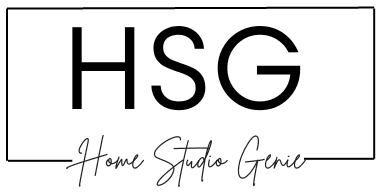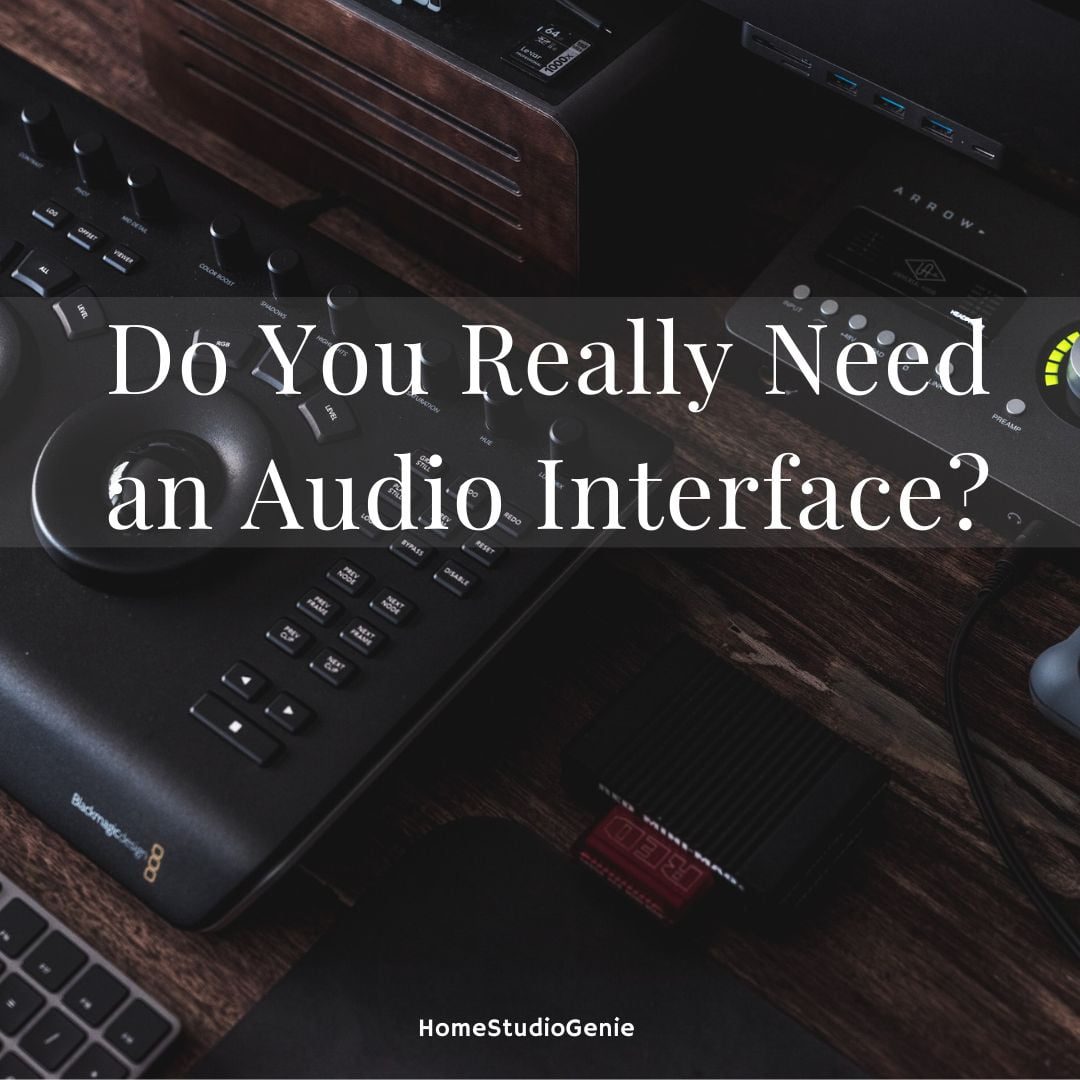Ever wondered why home studios are so cluttered with wires and different audio components? Well, this is because of the different hardware and pieces of instruments that connect everything together.
One of the most important pieces of equipment in a home studio is an audio interface. It acts as a connector between your computer and separate audio equipment and instruments.
Let’s find out which are the best audio interfaces around and if you really need one for your projects.
With that said, let’s dive right in.
Do I Need an Audio Interface for Music Production?
Yes, an audio interface is necessary both for beginners and professional music production. The connection between your computer and the audio hardware and instruments is a crucial one.

As a music producer and home studio owner, I understand the importance of having the right tools to create high-quality music.
One question that often comes up is whether an audio interface is necessary for music production. This question is often asked by beginner music producers who are just starting out.
An interface will ensure your sound comes out crisp and clean without any artifacts such as crackling.
What is an Audio Interface, Anyway?
Before we dive in, let me explain what an audio interface is.

Picture this: you’ve got your computer all set up with audio production software, virtual instruments, and a pair of decent headphones.
But to take things to the next level, an audio interface steps in.
An audio interface is a little device that connects your computer to the world of audio. It serves as the bridge between your digital world and the analog realm of instruments and microphones.
This little box has inputs for microphones and instruments, as well as outputs to connect studio monitors and headphones.
With its high-quality analog-to-digital converters, it turns real-world sounds into digital data that your computer can process.
See Also: How To Use Maschine In Ableton Live? (Explained)
Factors To Consider When Deciding On An Audio Interface:
- Recording audio: If you plan to record vocals, acoustic instruments, or any external sound sources, an audio interface is crucial. Great audio interfaces provide high-quality preamps that ensure clean and accurate audio signal conversion.
- Improved audio quality: Built-in sound cards on computers or laptops may not offer the same audio quality as dedicated audio interfaces. An external audio interface can deliver better sound fidelity, lower latency, and higher-resolution audio.
- Latency: Latency is the delay between the audio input and its playback through your computer’s speakers or headphones. Producers go for the best audio interface with low latency. This is essential for real-time monitoring during recording and for using software instruments without noticeable delays.
- Connectivity and Input/Output options: Audio interfaces come with various input and output options, such as XLR, TRS, MIDI, etc. This flexibility allows you to connect different types of microphones, instruments, and other audio gear to your computer.
- Stability and reliability: Dedicated audio interfaces are specifically designed for audio tasks and are less likely to experience compatibility or stability issues compared to built-in sound cards.
- Home studio setup: If you’re building a home studio, a good audio interface is a fundamental component that forms the backbone of your recording setup.
With that said, if your music production is entirely based on software instruments and MIDI controllers, you might not need an audio interface immediately.
In such cases, a high-quality pair of headphones or studio monitors might be enough.
5 Best Audio Interfaces For Beginner Music Producers:
- Focusrite Scarlett 2i2 audio interface

This is a great entry-level audio interface that is perfect for beginners. It has two inputs, so you can connect two microphones or other audio sources.
It also comes with a number of software plugins, including Ableton Live Lite and Pro Tools First. It’s also one of the best audio interfaces in EDM production.
- Audient iD4 audio interface

This is a step up from the Scarlett 2i2 and offers a few more features, such as phantom power and MIDI connectivity.
It also features a built-in headphone amp, which is great for monitoring your recordings.
- PreSonus AudioBox USB 96 audio interface

This is a great option for beginner music producers who need more inputs. It has four inputs, so you can connect up to four microphones or other audio sources.
It also has a built-in DSP effects processor, which can be used to add reverb, delay, and other effects to your recordings.
- Native Instruments Komplete Audio 2 audio interface

This audio interface comes bundled with a wide range of software plugins, including NI’s Komplete Start collection.
This is a great option for beginner music producers who want to get started with a wide range of different sounds.
- MOTU M2 audio interface

This audio interface is a bit more expensive than the others on this list, but it offers a number of features that make it a great choice for serious music producers.
It has eight inputs and four outputs, so you can connect a wide range of audio gear. It also has a built-in DSP effects processor and a high-quality headphone amp.
No matter which audio interface you choose, make sure to do your research and find one that is right for your needs. Check factors like the number of inputs and outputs you need, the features you want, and your budget.
The Real Deal: Recording Instruments and Vocals
If you’re serious about making music, the audio interface becomes your trusty companion. This is especially true if you plan on recording real instruments or vocals.
Sure, your computer’s built-in sound card might get you started, but let’s face it, it’s like comparing a basic flip phone to a state-of-the-art smartphone.
The audio interface will give you the professional-grade sound you crave for those top-notch recordings.
The Sweet Sound of Quality
Now, let’s talk about audio quality.
You want your music to sound sweet to the ears, right?
We all know that your computer’s sound card does the job for casual listening.

But – when you’re crafting your masterpiece, you need clarity, richness, and depth. An audio interface delivers just that and more.
Low Latency: The Ultimate Jamming Experience
Here’s the deal:
When you’re playing an instrument or singing, you want to hear yourself in real time without any delays.
That’s where low latency comes in.
Audio interfaces, especially those with ASIO drivers, make sure there’s minimal delay between your actions and what you hear.
For example:
The time between pressing a key on a MIDI keyboard and when the computer registers your action is almost instantaneous. This goes for other audio and instruments.
It’s like having a musical conversation that flows effortlessly, without awkward pauses or interruptions.
See Also: Are Gaming Laptops Good for Music Production? (7 Considerations)
Connecting All the Dots: Inputs and Outputs
You might wonder, “Can’t I just plug my guitar or microphone directly into the computer?” Technically, yes, but it’s like trying to fit a square peg into a round hole.

An audio interface comes with multiple inputs and outputs. Much like having a pocketful of adapters that connect everything seamlessly.
So go ahead, plug in your mic, your guitar, your MIDI keyboard, and whatever else you want.
With today’s technology, many audio interfaces are plug-and-play without much hassle. The computer and your DAW will automatically detect what audio interface it is.
Stability and Reliability: Music Production’s Best Friends
When inspiration strikes, you want to capture it without any hiccups. An audio interface is built to withstand long audio production sessions and give you the reliability you need.
No more worries about your sound cutting out during those crucial moments.
A good audio interface has your back, like a trusty sidekick on a music production project.
See Also: 12 Common Problems with FL Studio (Fixed)
Take the Plunge: My Personal Journey
I remember the time when we were starting our music production journey. I thought I could make do without an audio interface and just rely on my computer’s sound card.

Sure, I made some progress, but it felt like something was missing. My recordings lacked that professional touch. I also couldn’t get the low latency I craved for real-time jamming.
Finally, I decided to take the plunge and invest in a good-quality audio interface. It was a game-changer!
Suddenly, my recordings sounded pristine, and the low latency allowed me to groove with my instruments like never before.
It was as if I upgraded from a rusty bicycle to a sleek sports car.
But Do I Really Need It?
Now, you might be wondering, “Do I really need an audio interface if I’m just a beginner?” If you’re just starting and experimenting, you can get by without one.
But…
If you’re serious about music production and want your music to shine, an audio interface is a must-have.
It’s like the secret sauce that elevates your creations from good to exceptional.
To Wrap It Up – Do I Need An Audio Interface For Music Production?
With that said, an audio interface is a valuable tool for any music producer. This stands true even if you’re a beginner or an experienced creator.
It offers superior audio quality, low latency, and the flexibility to connect all your instruments and gear effortlessly. It opens up a world of possibilities.
As someone who’s been on this musical journey, I can vouch for the impact an audio interface can have on your music. Give your music the dedication it deserves, and invest in the best audio interface you can afford.
You’ll be amazed at the difference it makes in your music production projects.
Sources:
https://www.sweetwater.com/insync/audio-interface-buying-guide/
https://www.soundonsound.com/techniques/audio-interfaces-explained
https://ask.audio/articles/audio-interface-features-you-need-to-know
https://vanghost.com/focusrite-vs-audient-audio-interfaces/
FAQs
Can you use a DAW without an audio interface?
Yes, you can use a DAW such as Ableton Live or Logic Pro without needing an audio interface. If you want to record external instruments or vocals, an audio interface will come in handy.
Do I need an audio interface if I produce EDM (electronic dance music)?
Yes, it’s necessary for recording and mixing electronic music. This is because it allows you to connect your synthesizers, drum machines, and other hardware to your computer.
Do I need an audio interface for podcasting?
Do I need an audio interface for live performances?
No, an audio interface is not needed for live performances. The interface will only come in if the live performance needs to be recorded.

Mike is a skilled musician, guitar technician, and music producer with a passion for audio and gear. He excels in teaching guitar, editing podcasts/videos, and creating captivating soundscapes using cutting-edge hardware, software, and plugins. Mike’s talent and commitment make him highly sought-after in the industry, inspiring fellow musicians worldwide.


